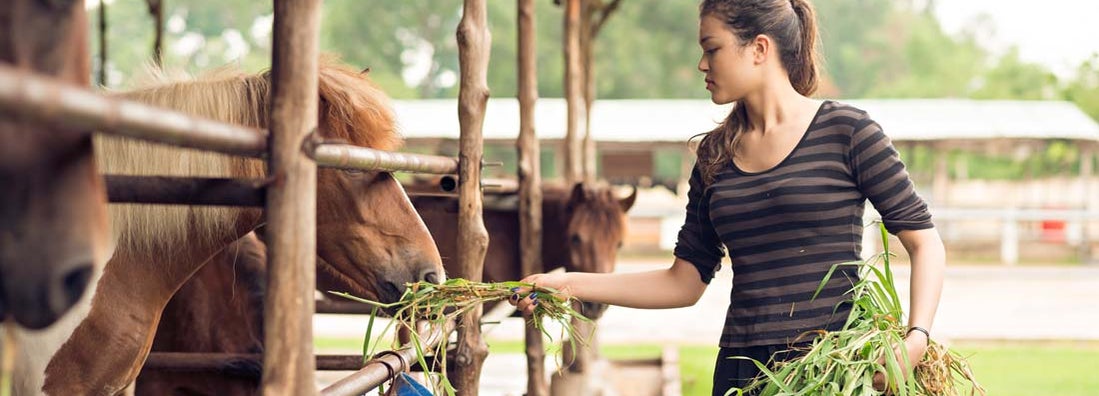How to Insure Hobby Farm
(What you need to know and more.)

Candace Jenkins is a licensed insurance advisor with over a decade of experience. She is also a writer and loves to write on all things insurance. Candace writes for TrustedChoice.com on a continuous basis and is here with the facts about all your insurance inquiries.

When it comes to your hobby farm, insurance should be at the top of your list to know about. Insuring your farm is important to protect yourself and your family, and making sure it's done right can save you a lot in the long run.
Your independent insurance agent is the perfect resource to have in your back pocket when it comes to insuring all aspects of your hobby farm. Knowing how coverage works and where to get it is essential in running a side hustle. But first, here's a bit of background to help give you a better understanding of what protecting your hobby farm includes.
How to Insure Your Hobby Farm
Insuring your hobby farm is one thing, but knowing where to start is another. Your farm is not only a source of enjoyment and some side hustle, but also a home to you and your family. To insure both aspects can be a bit daunting if you're not sure what you're looking for.
First, you'll need to have your independent insurance agent look at pricing and coverages for your hobby farm's specifications. So whether you have a small, few-acre hobby farm or your land is just shy of several miles, your coverage needs to apply adequately.
Your independent insurance agent will need to know the following to get started:
- Your hobby farm's specifics: What is on your hobby farm? What are you selling to the consumer and how do they get it? What crops or livestock do you produce? What are gross annual revenues of the farm? Remember, this will need to be a side hustle and not the main source of your income to truly be a hobby farm. What year were buildings built and what are the specifications of each? What types of equipment and machinery are on the premises?
- What are your buildings, equipment, machinery, farmhouse, livestock, and crops worth? This isn't the sentimental value, but what the market can bear and replacement cost. Meaning what is the value of each piece of equipment, building, livestock and crop if it were to be replaced?
- What preemptive protection do you have in place? Are there proper protocols to make sure the public stays off-premises and away from restricted parts of the farm? Are there security cameras? How are you protecting your dream?
When to Insure Your Hobby Farm
Immediately. If you already own a hobby farm that's not insured, you'll want to contact an independent insurance agent right away. If you're thinking of buying a hobby farm, give an agent a call, they can help get you set up right away. Plus, they may be able to give you a few tips for setting up your hobby farm in a way that lowers your premiums. There are a lot of moving parts when it comes to your farm and you'll want every potential risk covered.
Some risks that you'll want insurance for ASAP:
- Liability: For accidents that could potentially occur involving bodily injury and property damage.
- Crops: You'll need insurance to protect your products before, during and after.
- Livestock: Whether you have a prize-winning bull or an average steed, you'll need coverage for them.
- Equipment and machinery: What's a farm without a tractor? Some of those pieces of equipment and machinery can cost a pretty penny, getting them insured to value is necessary.
- Pole barns and other structures: Your barns are where you store all your farm gear and livestock, having them properly insured is, well, smart.
- Land: Whether you have a few acres or a hundred, you'll need them insured in case someone decides to stumble on your property.
Steps to Take in Minimizing Your Hobby Farm's Risk
By now, you should know that the main purpose of insurance, any insurance, is transfer of risk. You are essentially transferring your hobby farm's risk to the insurance carrier and paying a monthly, quarterly or annual premium for the right to tap into their reserves should a claim ever arise.
In order to offer the best and lowest premiums, insurance companies like to see that you take your hobby farm seriously. And by that, they mean they want you to be as proactive as possible in minimizing risk. The more risk you avoid, the more risk they avoid, and they will reward you by lower premiums.
Some premium-saving, risk-minimizing things to do on your hobby farm side hustle:
- Having clearly marked and sectioned off restricted areas to avoid curiosity seekers in case you're hobby farm draws in visitors.
- Having rules posted, marked and signed by any guests to avoid confusion and claims.
- Making sure all children are accompanied by an adult and that rules about that are posted.
- Having all equipment and heavy machinery restricted, disengaged and put out of harm's way.
How Much Will Hobby Farm Insurance Cost?
Hobby farm insurance rates are typically less expensive than for commercial farms, but it all depends on your hobby farm's specifics. Having a good idea of the following before your conversation with an independent insurance agent will help get you a fairly accurate estimate.
Items that impact your hobby farm insurance premiums:
- Number of acres: How much land you have will cause pricing to go up or down. The more you have to insure, the more premium you will pay.
- Barns and other structures: The number of barns and other structures and their size and quality will factor into your cost.
- Production: What you grow, harvest, produce and sell will also affect your premiums. It costs more to insure a tobacco hobby farm than a vegetable garden. The type of item and the more the inherent risk before, during and after its production will affect pricing.
- Farmhouse: Size, quality, and features of the home on your hobby farm will also impact your pricing.
- Equipment and machinery: Both motorized and unmotorized property like tractors and other equipment will need insuring, and the replacement cost for some of those pieces could be high, which will impact rates.
What Does and Doesn't Hobby Farm Insurance Cover?
When it comes to insuring your hobby farm, you should have a pretty good idea of what goes into it. Now you need to know what the policy will actually cover and what it won't.
Events your hobby farm insurance generally covers:
- Accidents: This can be coverage for fire, smoke, loading and unloading farm items, and more.
- Natural disasters: Volcanic eruptions and sinkholes. Typically, floods and earthquakes are covered under a separate policy.
- Weather events: Lightning, wind, hail, tornadoes and more. This is where a multiple peril crop insurance policy that can cover your precious goods comes in, as well as crop-hail insurance, so you can make sure your prized patch can weather the storms.
- Crimes and civil unrest: This is for theft and vandalism of your veggie garden crops.
What your hobby farm insurance doesn't cover:
- Natural wear and tear of your hobby farm's equipment or buildings.
- Non-working items or equipment damaged due to wear and tear.
The Benefits of an Independent Insurance Agent
Independent insurance agents have access to multiple insurance companies, ultimately finding you the best coverage, accessibility and competitive pricing while working for you. And as your hobby farm grows and your needs change, they'll be there to help you adjust your coverage, up or down, to make sure you're properly protected without overpaying. Find an independent insurance agent in your community here.